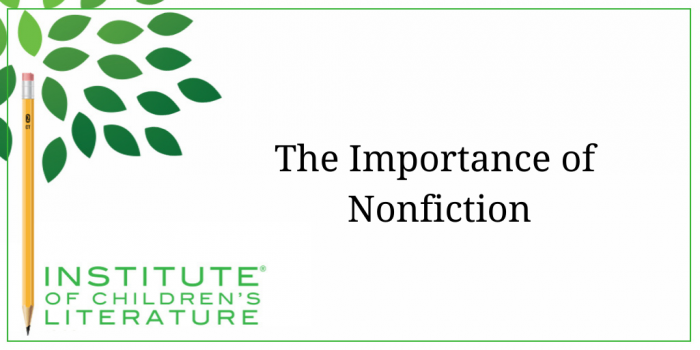1000 N. West Street #1200, Wilmington, DE 19801
© 2024 Direct Learning Systems, Inc. All rights reserved.

We teach our students how to write and get published!
View our Course Catalog >
Many writers view nonfiction as less: less creative than fiction, less fun than fiction, less interesting to kids than fiction, and definitely something they want to do less often. Some will accept the possibility of writing a little nonfiction to break into publishing, but do not like the idea of doing it steadily. For many, they want to do the important work of fiction.
But nonfiction is important. Especially now. Kids love nonfiction, and many young readers prefer it over fiction. Nonfiction is an important teaching tool in support of school curriculum. And nonfiction can offer children something that can help them long after the book is closed: an appreciation of the value of well-researched, accurate facts.
Facts and Truth
More and more schools are trying to teach children how to evaluate the information coming at them through a variety of sources: television, the Internet, and other media. The ability to evaluate information can help build a citizenry that is not easily taken in by the latest meme or by propaganda. And teachers use the kind of strong, well-researched, fact-based nonfiction crafted by children’s writers to help them with this essential learning goal.
This is one reason why nonfiction writers must be scrupulous in their own research and not snap up the most easily found information without checking into where it originated. Writers must look at the information and ask themselves: where does this data originate and did that source have an ulterior motive for providing it. For example, quoting cancer statistics provided by big tobacco companies would be problematic as the source has a vested interest in pushing a very specific reality that might not actually be true. One rule of thumb is to use facts that are supported by multiple sources.
Facts and Opinion
Writers who are crafting informational nonfiction must also be scrupulous about sorting fact from opinion. Facts have evidential support, but opinions have a subjective component. And when writing nonfiction for children, it is important not to weigh the piece heavily toward opinion. Often newer writers will tend to weigh toward opinion because opinion feels more fun and exciting.
For example, consider the following:
Sharks are so cool. They are beautiful and deadly. They are also scary, but not all sharks are vicious monsters. Some are actually peaceful, gentle creatures. And all sharks play an important part in the complicated ecology of the ocean.
The bulk of that paragraph was opinion. Now some of it did have some evidence to support it, but most of it was vague and subjective. And much of it was built from value judgements. Cool, beautiful, vicious, monster, and even peaceful and gentle have an element of value judgment inherent in the word. They are conclusions someone came to about sharks based on a mix of observation/information and personal opinion. Once you mix opinion into facts, the concoction becomes suspect. A paragraph like the one above might be used in the classroom as an example of untrustworthy nonfiction, and we never want to be the negative example. So weigh your nonfiction writing and consider: how much opinion is mixed into this fact? Keep the subjective sentences few and clear so children can easily tell which parts are fact. A little opinion can spoil a fact.
Facts are Actually Fun
But if you can’t mix in some lively opinion sentences, how do you turn boring old nonfiction into something palatable? You do it by choosing subjects that aren’t boring to you. Your own excitement over the topic will help you to choose the most interesting aspect of the subject instead of simply skimming the easy to find facts (which are often the most obvious ones, and the most boring).
Research is the key. It’s the key to writing accurate nonfiction. And it is also the key to writing exciting nonfiction. A truly great nonfiction writer eventually falls in love with research, because it is in the hunt through the data that you will find the part of the subject that excites you and makes you want to keep reading. And if you want to keep reading, then you’ve probably found the material that will affect a kid (and an editor) the same way.
1000 N. West Street #1200, Wilmington, DE 19801
© 2024 Direct Learning Systems, Inc. All rights reserved.
1000 N. West Street #1200, Wilmington, DE 19801
© 2024 Direct Learning Systems, Inc. All rights reserved.
1000 N. West Street #1200, Wilmington, DE 19801
© 2024 Direct Learning Systems, Inc. All rights reserved.
1000 N. West Street #1200, Wilmington, DE 19801
© 2025 Direct Learning Systems, Inc. All rights reserved.
1000 N. West Street #1200, Wilmington, DE 19801
©2025 Direct Learning Systems, Inc. All rights reserved. Privacy Policy.